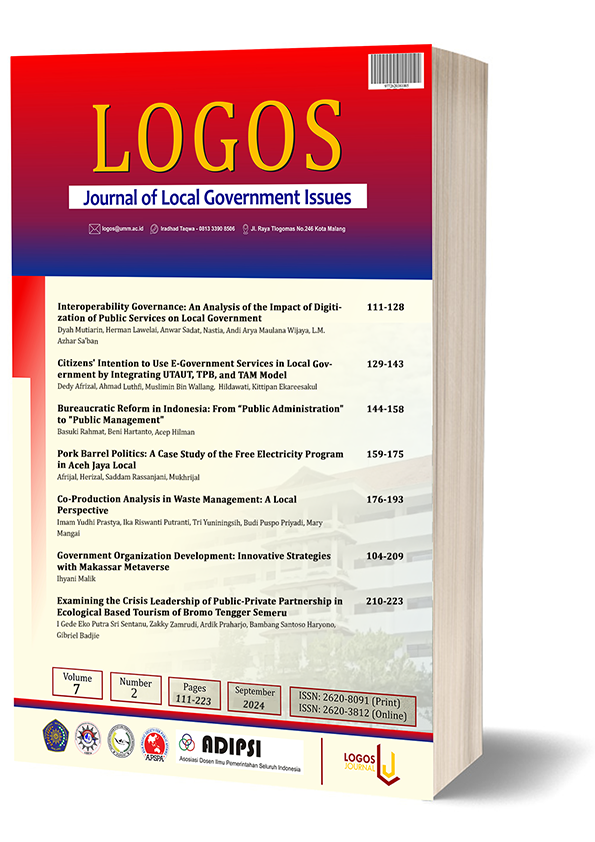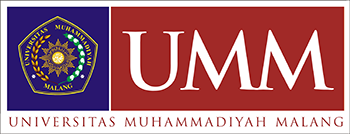Bureaucratic Reform in Indonesia: From “Public Administration" to "Public Management"
DOI:
https://doi.org/10.22219/logos.v7i2.33848Keywords:
entrepreneurship; Government; new public administration; public administrationAbstract
Indonesia has continued to experience increasingly complex, global developments and requires change. However, there has been no reform in the government sector that is needed to anticipate these developments, especially regarding public administration. The aim of this research is to analyze the public administration reform in Indonesia. The research method used is a qualitative research method, and literatures study for gathering the data. The research results show that government institutions no longer monopolize the roles that have previously been the authority of the government. Therefore, the public administration paradigm needs to be reformed starting from government to the governance process. The government needs to increase management capacity and change the culture towards a new public management direction. In the systems paradigm, the government is encouraged not to focus on systems and procedures, but to be more performance oriented and work by emphasizing an entrepreneurial spirit.
Downloads
References
Adzikri, F., Notosudjono, D., & Suhendi, D. (2017). Strategi Pengembangan Energi Terbarukan di Indonesia. Jurnal Online Mahasiswa (Jom) Bidang Teknik Elektro, 1(1), 1–13. http://jom.unpak.ac.id/index.php/teknikelektro/article/view/667
Ahmad, A., Rahman, A., Wahiddin, M. R., Ur, F., Khelil, A., & Lbath, A. (2018). Context-aware services based on spatio-temporal zoning and crowdsourcing. 3001. https://doi.org/10.1080/0144929X.2018.1476586
Ahmeti, R., & Kosovo, R. B. (2017). Risk Management in Public Sector: A Literature Review. European Journal of Multidisciplinary Studies, 2(15), 190-196. https://doi.org/10.26417/ejms.v5i1.p323-329
Alfada, A. (2019). Does Fiscal Decentralization Encourage Corruption in Local Governments? Evidence from Indonesia. Journal of Risk and Financial Management, 12(3), 118-133. https://doi.org/10.3390/jrfm12030118
Andrews, R. (2014). Performance management and public service improvement. The Public Policy Institute for Wales, 3, 1–13.
Aufiya, M. A. (2023). Factors In Constructing Indonesia’s Perspectives On The Indo-Pacific. Journal of Liberty and International Affairs, 9 (1), 253–264. Institute for Research and European Studies. https://doi.org/10.47305/JLIA2391259a
Austra, F. R. O. M., & An, A. L. (2019). Successful Public Policy: Lessons from Australia and New Zealand. In Successful Public Policy: Lessons from Australia and New Zealand. https://doi.org/10.22459/spp.2019
Aziz, F. N., Mubin, F., Hidayat, R. J. P., Nurjaman, A., Romadhan, A. A., Sulistyaningsih, T., & Hijri, Y. S. (2021). Bagaimana Teknologi Informasi dan Komunikasi Bertransformasi Menjadi Inovasi Pelayanan Publik? Perspektif, 10(2), 616–626. https://doi.org/10.31289/perspektif.v10i2.4905
Barker, J., & Barker, J. (2020). STS, Governmentality, and the Politics of Infrastructure in Indonesia in Indonesia. 11(1), 91–98. https://doi.org/10.1215/18752160-3783565
Barton, G. (2020). Indonesia’s Year of Living Normally: Taking the Long View on Indonesia’s Progress. Southeast Asian Affairs, 20(8), 123–145.
Berdej, S. M., & Armitage, D. R. (2016). Bridging organizations drive effective governance outcomes for conservation of Indonesia’s marine systems. PLoS ONE, 11(1), 1–26. https://doi.org/10.1371/journal.pone.0147142
Bernstein, R., Chadha, A., & Montjoy, R. (2011). Overreporting Voting: Why It Happens and Why It Matters. Public Opin Q,65(1), 22–44.
Bouazizi, T., Hadhek, Z., Mrad, F., & Lafi, M. (2021). Changes in demand for crude oil and its correlation with crude oil and stock market returns volatilities: Evidence from three asian oil importing countries. International Journal of Energy Economics and Policy, 11(3), 27–43. https://doi.org/10.32479/ijeep.10650
Flury, C. (2023). Joining forces: The promotion of public-private partnerships to bring computers into West German schools in the 1980s. How Computers Entered the Classroom, 1960-2000: Historical Perspectives, 123–145. https://doi.org/10.1515/9783110780147-006
Foundation, A., & Foundation, A. (2017). The following publication is available in this digital format thanks to financial support from the ACUHO-I Foundation. October.
Gallo, H. B., Kobayashi, L. C., & Finlay, J. M. (2022). Older Americans’ Perceptions of the Federal Government’s Pandemic Response: Voices From the COVID-19 Coping Study. Research on Aging, 44(7–8), 589–599. https://doi.org/10.1177/01640275211062111
Gede, L., & Artini, S. (2017). Analisis Pendapaytan Asli Daerah (PAD) Dalam Upya Pelaksanaan Otonomi Daerah di Kabupaten Badung Bali. E-Jurnal Manajemen Unud, 6(5), 2360–2387.
Hadiz, V. R. (2017). Indonesia’s year of democratic setbacks: towards a new phase of deepening illiberalism? Bulletin of Indonesian Economic Studies, 53(3), 261–278. https://doi.org/10.1080/00074918.2017.1410311
Hasyim, A. W. (2020). Becoming Indonesia: Political Gait of the Arabs in the Pre-Independence Period. Insaniyat: Journal of Islam and Humanities, 4(2), 88-100. https://doi.org/10.15408/insaniyat.v4i2.15229
Hidjaz, M. K., Mamonto, M. A. W. W., & Buana, A. P. (2020). Legal politics of party simplification in Indonesia: A study based on the political party regulatory model. International Journal of Criminology and Sociology, 9, 1210–1225. https://doi.org/10.6000/1929-4409.2020.09.141
Horhoruw, M., Karippacheril, T. G., Sutiyono, W., & Thomas, T. (2012). Transforming the Public Sector in Indonesia: Delivering Total Reformasi. World Bank Publication, March, 1–14. http://siteresources.worldbank.org/EXTGOVANTICORR/Resources/3035863-1289428746337/Transforming_Public_Sector_Indonesia.pdf
Hughes, O. E. (2012). Public Management and Administration. In Public Management and Administration. https://doi.org/10.1007/978-1-137-00305-8
Kalimantan, W., & Kalimantan, W. (2017). Decentralization and Chinese Indonesian Politics: The Case of. 19, 1–10.
Kusumasondjaja, S. (2018). The roles of message appeals and orientation on social media brand communication effectiveness: An evidence from Indonesia. Asia Pacific Journal of Marketing and Logistics, 30(4). https://doi.org/10.1108/APJML-10-2017-0267
Larimer, K. B. S. and C. W. (2009). The Public Policy Theory Primer. California. Westview Press.
Life, P. (2020). Artificial Intelligence and Public Standards A Review by the Committee on Standards in Public Life Artificial Intelligence and Public Standards. February.
Limba, R. S. (2019). Sustaining innovation and change in government sector organizations: Examining the nature and significance of politics of organizational learning. Journal of Strategy and Management, 12(1), 103–115. https://doi.org/10.1108/JSMA-10-2017-0075
Listiyani, N., Said, M. Y., & Khalid, A. (2023). Strengthening Reclamation Obligation through Mining Law Reform: Indonesian Experience. Resources, 12(5). https://doi.org/10.3390/resources12050056
Mihaiu, D. M., Opreana, A., & Cristescu, M. P. (2010). Efficiency, effectiveness and performance of the public sector. Romanian Journal of Economic Forecasting, 13(4), 132–147. https://ideas.repec.org/a/rjr/romjef/vy2010i4p132-147.html
Mikkal, E. (2020). Indonesia: A Regional Energy Leader in Transition.
Mirosa, M., Yip, R., Lentz, G., & Mirosa, M. (2018). Content Analysis of the ‘ Clean Your Plate Campaign ’ on Sina Weibo Content Analysis of the ‘ Clean Your Plate Campaign ’ on Sina Weibo. Journal of Food Products Marketing, 24(5), 539–562. https://doi.org/10.1080/10454446.2018.1472696
Muhammad, F. (2014). Leadership, Governance and Public Policy Implementation Competencies in the Broader Public Sector. European Journal of Business and Management, 6(36), 66–74.
Muluk, M. (2021). Systematic Literature Review On Asymmetric Decentralization. BISNIS & BIROKRASI: Jurnal Ilmu Administrasi Dan Organisasi, 28(2), 96-106. https://doi.org/10.20476/jbb.v28i2.1036
Nauenberg, E., & Yurga, E. (2023). Public–private partnership alternative for a national pharmacare program in Canada. Journal of Pharmaceutical Policy and Practice, 16(1), 1–6. https://doi.org/10.1186/s40545-023-00526-3
Novriando, A. (2020). Efektivitas “Jogja Smart Service” Terhadap Pelayanan Publik di Kota Yogyakarta. Jurnal Ilmu Pemerintahan, 13(2), 68–75.
Nurati, D. E. (2016). Komunikasi kebijakan Publik dalam Pengelolaan Pedagang Kaki Lima Berbasis Pada Kearifan Lokal (Kajian Pengelolaan Pedagang Kaki Lima di Kota Surakarta). JPAP: Jurnal Penelitian Administrasi Publik, 2(01), 93–106. https://doi.org/10.30996/jpap.v2i01.701
Nurshafira, T., & Alvian, R. A. (2019). Political-Economy of Social Entrepreneurship in Indonesia: A Polanyian Approach. Jurnal Ilmu Sosial Dan Ilmu Politik, 22(2), 144. https://doi.org/10.22146/jsp.27942
Pandey, P., & Pandey, M. M. (2015). Research methodology. In SpringerBriefs in Applied Sciences and Technology (Issue 9783319068282). https://doi.org/10.1007/978-3-319-06829-9_3
Pengestika, O. (2020). Budaya Birokrasi Dalam Mewujudkan Good Governance di Sekretariat Daerah Provinsi Kalimantan Tengah. Pencerah Publik, 7(1), 11-21. https://doi.org/10.33084/pencerah.v7i1.1378
Pramanti, A., Sulaiman, A.,(2019). Labour, Democracy and Identity Politics, in Indonesian Industry During the Jokowi Era. 10(7), 320–331.
Roberts, K. M. (2013). Market Reform, Programmatic (De) alignment, and Party System Stability in Latin America. Comparative Political Studies, 46(11), 1422–1452. https://doi.org/10.1177/0010414012453449
Reza FDL, A., Hadi, K., & Nurjaman, A. (2020). Inovasi Pelayanan Publik melalui penerapan Sistem Elektronik Surat Keterangan (E-SUKET) di Kota Kediri. Jurnal Ilmu Pemerintahan, 13(2), 105–112. https://doi.org/10.31947/jgov.v13i2.9374
Robinson, M. (2015). From Old Public Administration to the New Public Service Implications for Public Sector Reform in Developing Countries. UNDP Global Centre for Public Service Excellence, 1–20.
Rochadi, A. F. S., Pramanti, A., & Sulaiman, A. (2019). Labour, democracy and identity politics, in Indonesian industry during the Jokowi Era. International Journal of Innovation, Creativity and Change, 10(7), 320–331.
Sacramento. E. (2020). Local Government Initiatives and Prospects for Mango Farming Community Capital Enhancement in Guimaras Province, Philippines. Journal of Local Government Issues (LOGOS), 3(2), 1-11. https://doi.org/10.22219/logos.v3i1.10699
Sarpan. (2012). Kajian Reformasi Administrasi Publik Untuk Membangun Daya Saing Daerah. GOVERNANCE Jurnal Kebijakan Dan Manajemen Publik, 3(1), 35–46. https://doi.org/10.38156/gjkmp.v2i2.44
Schneider, I. (2017). Osborne, D. and Gaebler, T. 1992. Reinventing Government. New York, NY. Journal of Leisure Research, 27(3), 302–304. https://doi.org/10.1080/00222216.1995.11949751
Siregar, S. N., Raffiudin, R., & Noor, F. (2022). Democratic regression in Indonesia: Police and low-capacity democracy in Jokowi’s administration (2014–2020). Jurnal Ilmu Sosial Dan Ilmu Politik, 26(2), 197–212. https://doi.org/10.22146/jsp.72129
Sommaliagustina, D. (2019). Implementasi Otonomi Daerah dan Korupsi Kepala Daerah. Journal of Governance Innovation, 1(1), 44–58. https://doi.org/10.36636/jogiv.v1i1.290
Sørensen, E., & Waldorff, S. B. (2014). Collaborative policy innovation: Problems and potential. Innovation Journal, 19(3).
Sorik, S. (2019). Penataan Demokrasi Dan Pemilu Di Indonesia Pasca Reformasi. Jurnal Penelitian Politik, 16(1), 101. https://doi.org/10.14203/jpp.v16i1.773
Suparjo, S., Darma, S., Kurniadin, N., Kasuma, J., Priyagus, P., Darma, D. C., & Haryadi, H. (2021). Indonesia’s new sdgs agenda for green growth – emphasis in the energy sector. International Journal of Energy Economics and Policy, 11(3), 395–402. https://doi.org/10.32479/ijeep.11091
Sutojo, A. (2015). Pengaruh pelaksanaan kebijakan atau aturan terhadap pelayanan sektor publik di kelurahan purwodadi kecamatan arga makmur kabupaten bengkulu utara. Jurnal Penelitian Sosial Dan Politik, 4(2), 1–11.
Thye Woo, W. (2017). Adjusting to the New Domestic Normal and the New International Normal: Supply-side Structural Reform 2.0. China’s New Sources of Economic Growth, 2 (2). https://doi.org/10.22459/cnseg.07.2017.05
Thompson, K. N. (2010). Servant-Leadership: An Effective Model For Project Management. School of Business and Technology, August, 143.
Torfing, J., & Ansell, C. (2017). Strengthening political leadership and policy innovation through the expansion of collaborative forms of governance. Public Management Review, 19(1), 37–54. https://doi.org/10.1080/14719037.2016.1200662
Turner, M., Prasojo, E., & Sumarwono, R. (2022). The challenge of reforming big bureaucracy in Indonesia. Policy Studies, 43(2), 333-351.
Untari, D. T., Satria, B., Fikri, A. W. N., Nursal, M. F., & Winarso, W. (2020). Technology, social media and behaviour of young generation in Indonesia; a conseptual paper. International Journal of Scientific and Technology Research, 9(4).
Wahyudi, M., & Wulandari, E. (2017). Kinerja Keuangan Pemerintah Daerah Era Otonomi Daerah (Studi Kasus Pemerintah Daerah Kota Magelang). Jurnal RAK (Riset Akuntansi Keuangan), 2(3), 26–32.
Walby, K., & Wilkinson, B. (2021). The visual politics of public police Instagram use in Canada. New Media and Society, 25(5), 898-920 https://doi.org/10.1177/14614448211015805
Downloads
Published
How to Cite
Issue
Section
License
Copyright (c) 2024 Basuki Rahmat, Beni Hartanto, Acep Hilman

This work is licensed under a Creative Commons Attribution-ShareAlike 4.0 International License.
Authors who publish with this journal agree to the following terms:
- Authors retain copyright and grant the journal right of first publication with the work simultaneously licensed under a Creative Commons Attribution-ShareAlike 4.0 International License. that allows others to share the work with an acknowledgment of the work's authorship and initial publication in this journal.
- Authors are able to enter into separate, additional contractual arrangements for the non-exclusive distribution of the journal's published version of the work (e.g., post it to an institutional repository or publish it in a book), with an acknowledgment of its initial publication in this journal.
- Authors are permitted and encouraged to post their work online (e.g., in institutional repositories or on their website) prior to and during the submission process, as it can lead to productive exchanges, as well as earlier and greater citation of published work (See The Effect of Open Access).

This work is licensed under a Creative Commons Attribution-ShareAlike 4.0 International License.













